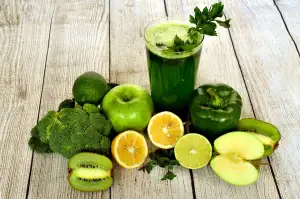Unveiling the Nutritional Secrets: Are Pretzels Truly Healthy? Dive into the Health Benefits of this Popular Snack!

- Understanding the Ingredients in Pretzels
- Calorie Content: How Many Calories are in Pretzels?
- Fat Content: Are Pretzels Low in Fat?
- Sodium Levels: Evaluating the Salt Content in Pretzels
- Fiber and Protein: Do Pretzels Provide Essential Nutrients?
- Micronutrients: Examining the Vitamin and Mineral Content in Pretzels
- Health Benefits: Are There any Advantages to Consuming Pretzels?
- Moderation and Portion Control: Tips for Enjoying Pretzels Responsibly
Pretzels, a popular snack enjoyed by people of all ages, have long been a staple in the world of snacking. But what exactly is the nutritional value of these twisted treats? Are they as healthy as they seem? In this article, we will delve into the various aspects of pretzels' nutritional content to uncover their true health benefits. From calorie and fat content to sodium levels and micronutrients, let's unravel the secrets behind this beloved snack and make informed choices about our health.
Understanding the Ingredients in Pretzels
To truly unveil the nutritional secrets of pretzels, it is important to understand the ingredients that make up this popular snack. Traditional pretzels are typically made from a simple combination of flour, water, yeast, and salt. However, modern variations may also include additional ingredients such as sugar, vegetable oil, and various flavorings.
Flour is the main ingredient in pretzels and provides carbohydrates for energy. It can be made from wheat, whole wheat, or other grains depending on the type of pretzel. Water is used to hydrate the dough and activate the yeast, which helps with leavening.
Yeast is responsible for the fermentation process that gives pretzels their distinct texture and flavor. Salt is a key ingredient that enhances the taste of pretzels but should be consumed in moderation due to its potential impact on blood pressure.
Additional ingredients like sugar and vegetable oil can vary depending on the brand or recipe. Sugar adds sweetness while vegetable oil contributes to texture and moisture retention.
By understanding these basic ingredients in pretzels, we can better evaluate their nutritional value and make informed choices about incorporating them into our diet.
Calorie Content: How Many Calories are in Pretzels?
Pretzels are a popular snack enjoyed by many, but how many calories do they actually contain? On average, a single pretzel has about 100-150 calories. However, it's important to note that the calorie content can vary depending on the size and type of pretzel. For example, larger pretzels or those with added toppings like cheese or sugar may have higher calorie counts. It's always a good idea to check the nutrition label for accurate information and be mindful of portion sizes to enjoy pretzels as part of a balanced diet.
Fat Content: Are Pretzels Low in Fat?
When it comes to the fat content in pretzels, the news is generally positive. Traditional pretzels are typically low in fat, making them a healthier snack option compared to other indulgent treats. However, it's important to note that some flavored or coated varieties may have higher fat content due to added ingredients.
Plain pretzels made from flour, water, and yeast contain minimal amounts of fat. On average, a serving of pretzels contains less than 1 gram of fat. This makes them an attractive choice for those watching their fat intake or trying to maintain a healthy weight.
It's worth mentioning that the type of fat present in pretzels is also important. Most of the fat found in pretzels is unsaturated fat, which is considered heart-healthy when consumed in moderation. Unsaturated fats can help lower bad cholesterol levels and reduce the risk of heart disease.
However, it's crucial to be mindful of portion sizes and avoid excessive consumption. While pretzels may be low in fat, eating large quantities can still contribute to calorie intake and potentially lead to weight gain. As with any food, moderation is key.
In summary, plain pretzels are generally low in fat and can be enjoyed as part of a balanced diet. Opting for plain varieties without added flavors or coatings will ensure you're getting the healthiest option. Remember to practice portion control and enjoy pretzels as an occasional treat rather than a daily indulgence.
Sodium Levels: Evaluating the Salt Content in Pretzels
One important aspect to consider when assessing the nutritional value of pretzels is their sodium content. Pretzels are known for their salty taste, which is a result of the salt used in their preparation. However, excessive sodium intake can have negative effects on our health, such as increasing blood pressure and the risk of heart disease.
On average, a serving of pretzels contains around 300-400 milligrams of sodium. This amount may vary depending on the brand and type of pretzel. While this may not seem like much, it can quickly add up if you consume multiple servings or pair your pretzels with other high-sodium foods.
To put things into perspective, the American Heart Association recommends limiting daily sodium intake to no more than 2,300 milligrams, with an ideal limit of 1,500 milligrams for most adults. Therefore, it's crucial to be mindful of your overall sodium consumption and consider other sources of salt in your diet.
If you're watching your sodium intake, there are low-sodium or reduced-salt options available in the market. These alternatives can help you enjoy pretzels while keeping your sodium levels in check. Additionally, opting for homemade pretzels allows you to control the amount of salt added during the baking process.
Remember that moderation is key when it comes to enjoying pretzels or any other snack. Being aware of the sodium content and practicing portion control will enable you to make informed choices about including pretzels as part of a balanced diet while maintaining good health.
Fiber and Protein: Do Pretzels Provide Essential Nutrients?
Fiber and protein are essential nutrients that play a crucial role in our overall health. When it comes to pretzels, they do provide some fiber and protein, although the amounts may vary depending on the brand and type of pretzel. Whole wheat pretzels tend to have higher fiber content compared to regular pretzels made from refined flour. However, it's important to note that the fiber and protein content in pretzels is relatively low compared to other snack options like nuts or Greek yogurt. So while pretzels can contribute to your daily intake of these nutrients, it's advisable to incorporate a variety of foods into your diet for optimal nutrition.
Micronutrients: Examining the Vitamin and Mineral Content in Pretzels
While pretzels may not be a significant source of vitamins and minerals, they do contain some essential nutrients. Pretzels are particularly rich in iron, which is important for carrying oxygen to our cells and maintaining energy levels. Additionally, they provide small amounts of other minerals such as magnesium, phosphorus, and zinc.
In terms of vitamins, pretzels contain trace amounts of B vitamins like thiamine (B1) and niacin (B3), which play a crucial role in converting food into energy. However, it's important to note that the vitamin content in pretzels is relatively low compared to other foods.
Overall, while pretzels may not be a powerhouse of micronutrients, they can still contribute to your daily intake of certain minerals and vitamins. It's always beneficial to pair them with nutrient-dense foods like fruits or vegetables to ensure a well-rounded diet.
Health Benefits: Are There any Advantages to Consuming Pretzels?
Pretzels may not be the most nutrient-dense snack, but they do offer some health benefits. Firstly, pretzels are low in fat and cholesterol, making them a healthier option compared to other snacks. Secondly, they provide a decent amount of carbohydrates, which can be beneficial for energy levels. Additionally, pretzels contain small amounts of fiber and protein, which can help keep you feeling full and satisfied. While pretzels may not be a superfood, they can still be enjoyed as part of a balanced diet.
Moderation and Portion Control: Tips for Enjoying Pretzels Responsibly
Moderation and portion control are key when it comes to enjoying pretzels responsibly. While pretzels can be a tasty snack, it's important not to overindulge. Stick to a serving size of about 1 ounce or 28 grams, which is typically around 10-12 small pretzels. Avoid mindlessly snacking straight from the bag, as this can lead to consuming more than intended. Pairing pretzels with a source of protein or healthy fat, such as hummus or nut butter, can help increase satiety and prevent overeating. Remember, balance is key in maintaining a healthy diet.
In conclusion, pretzels can be a part of a healthy diet when consumed in moderation and with awareness of their nutritional content. While they are low in fat and calories compared to other snacks, they do contain high levels of sodium. However, pretzels also provide some fiber and protein, along with essential micronutrients. To enjoy pretzels responsibly, it is important to practice portion control and choose whole grain options whenever possible. By making informed choices about pretzels, you can indulge in this popular snack without compromising your health.
Published: 09. 12. 2023
Category: Health



